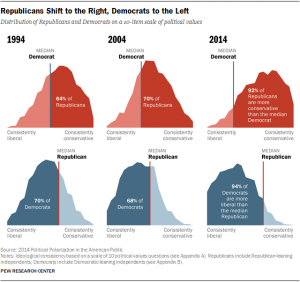The Prisoners’ Dilemma of Modern American Politics
The modern American political system has become extremely polarized over the last two decades. In 1994, 64% of Republicans were more conservative than the median Democrat while 70% of Democrats were more liberal than the median Republican. By 2014, those numbers increased drastically to 92% and 94%, respectively. What those numbers and their corresponding graphs (below) tell us is that we have witnessed a systematic destruction of the political center in this country. It is a phenomenon that has raised the political consequences of every decision that our elected officials now make and it is why American politics has been effectively transformed into a prisoners’ dilemma.
One of the central issues in the development of the American political system into a prisoners’ dilemma is the problem of money in politics. Our current two-party system gives both Republicans and Democrats an enormous advantage in campaigning and fundraising that essentially acts as a barrier to entry for third party or independent candidates. This further reinforces the core identities of the two parties because the politicians that run for office commonly line up fairly consistently with their party line in order to raise more money, thus shrinking the political center even more.
This kind of polarization reframes the national political discourse as a zero-sum game. Whatever gains the left achieves are losses of the right. However, that has never been the case in the past and it should not be now or in the future. Polarization has incentivized policy-makers to simply settle for the third-best option because of the political cost of negotiating and compromising with the other side of the aisle. In an incredibly polarized two-party system, the act of negotiating a way out of a prisoners’ dilemma by any legislator is seen as total capitulation and weakness – grounds for losing reelection.
The current debate in Congress over the budget and the funding of Planned Parenthood is the perfect example. Republicans want to appear boldly conservative to their supporters and Democrats want to seem resolutely liberal. While the best outcome may be a favorable restructuring of Planned Parenthood’s funding that appeases both parties as well as the millions of women that depend on their services, one very likely outcome will be the third-best option of a temporary government shutdown. Because our polarized two-party system effectively prioritizes the perception of ideological values and fundraising potential over mutually beneficial collective action, we are doomed to that third-best option. Until we find a way to reestablish the American political center, the prisoners’ dilemma of American politics will likely remain the status quo.
Sources: http://www.economist.com/blogs/democracyinamerica/2013/06/polarisation
http://thehill.com/blogs/congress-blog/politics/179361-politics-and-the-prisoners-dilemma
http://www.people-press.org/2014/06/12/section-1-growing-ideological-consistency/#interactive

